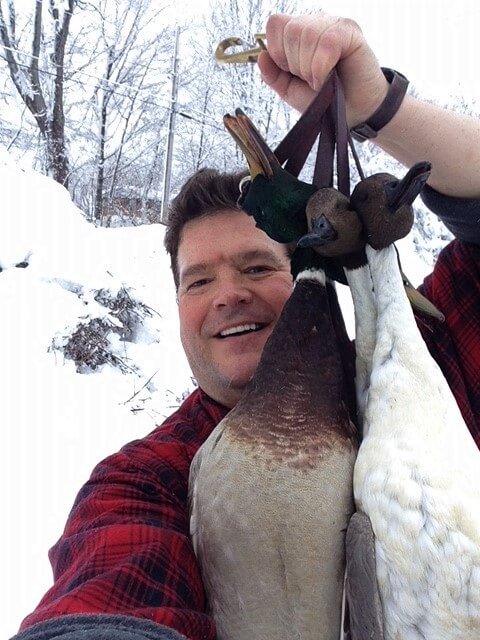Hitting a trifecta in the deep cold of early November

The old muzzleloader has been put back into the gun cabinet. Unfired for another year.
There is a wave of sadness that I couldn’t bring a deer home this year. But on the bright side there is this: We are sitting in our makeshift shore blind fabricated from driftwood caused by an early November Nor’easter, and we’re huddled behind the twisted branches with cattails and johnson grass woven in between the homemade front. It’s cold. Really cold. I note that my feet are numb, and my partner, John, replies that he can no longer feel the tips of his fingers. We have both set our shotguns to lean against the structure and simultaneously bend toward the propane heater on the ground. The heat makes our appendages sting.
Decoys float in the breeze at the edge of the ice line about 10 yards offshore. They bob happily, dipping their plastic bills in the wavelets and accumulating ice that hangs downward to the surface. If this sounds like a miserable way to spend your time off, you may be a part of a society that prides itself on creature comforts over wily adventure. I, for one, have always been attracted to the challenges of discomfort when hunting. I embrace the cold Northwest wind and revel in the freezing spray of water as it splashes over the bow of the boat. Maybe there is a bit of masochistic tendency in my nature, but I like to feel like my hunts reflect the determination to overcome the odds and not just survive but thrive in nature’s adversity.
John looks out over the lake and says, “Looks like we’ve got a good squall comin’ in from across the lake.” Yep,” I reply “I’m ready to play! How about you?”
We both know that this late in the season, nasty weather from the north brings in new birds. Big red-legged mallards from the upper half of the lake that has been frozen for weeks. These heartiest of birds are the largest and fattest migrators to pitch in to the bay at the very end of the duck season. They thrive on the harshest of conditions – just like I do – swimming among the ice flows and picking up aquatic grasses that blow into the shoreline. They are fully plumed with bright green heads, stark auburn chests, beet-red legs and a couple of fancy curls on their tails. These birds are the strongest and healthiest of the flocks.
As a wall of white works its way across the lake, we reach for our shotguns and check to see that the actions aren’t frozen from the frigid temperature sending icy mist off the water. We scan the skies together; John speaks up first. “Big birds at 10 o’clock! they’re comin in on rails!” We crouch behind the wall of driftwood and watch. “They’re cupping!” I say, “Legs down and lookin’.”
“We go up on the count of three, okay?” John enthusiastically whispers. “One…two…three!” We both stand and shoulder our guns. Leading the birds by just a few feet and swinging our barrels through the snowflakes as we fire. One. Two. Three. I know that I shot three times but assume that John must have shot at the same instant that I did. I turn to him and say “Three birds down! Nice shooting buddy!”
But something in John’s eyes look askew. “How many did you hit?” I ask him. “None!” he replies. My damn gun froze!” “You’re kidding?” I say. “Well how did three birds fall then?” John replies, “By obvious deduction my friend, you just shot a triple!”
I can’t believe it. Really? I’ve shot only one other triple in my 38 years of duck hunting. “Well, you did it today” John replies. I walk out to the ice line and into the decoys to retrieve my birds. Two drake pintails and a drake mallard with a band on its leg. Holy cow! This is like hitting the trifecta of hunting!
John slaps my back and gives me a high five then walks back to the blind. I sit down beside him, and as he leans into the heater he asks me if my feet and hands are still cold. I realize that my blood has been pumping overtime and all the pain we suffered earlier has disappeared. My heart is beating hard and my spirit is flying. Like they use to say in the gym “No pain. No gain.”
Bradley Carleton is executive director of Sacred Hunter.org, a nonprofit that seeks to educate the public on the spiritual connection of man to nature.
